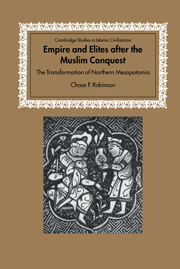Book contents
- Frontmatter
- Contents
- Preface
- Acknowledgements
- List of abbreviations
- Note on dates and citations
- Map: The Fertile Crescent in the early Abbasid period
- 1 Conquest history and its uses
- 2 The seventh-century Jazira
- 3 From garrison to city: the birth of Mosul
- 4 Christian élites in the Mosuli hinterland: the Shahārija
- 5 Islam in the north: Jaziran Khārijism
- 6 Massacre and narrative: the Abbasid Revolution in Mosul I
- 7 Massacre and élite politics: the Abbasid Revolution in Mosul II
- Conclusion
- Bibliography
- Index
- Other titles in the series
6 - Massacre and narrative: the Abbasid Revolution in Mosul I
Published online by Cambridge University Press: 13 August 2009
- Frontmatter
- Contents
- Preface
- Acknowledgements
- List of abbreviations
- Note on dates and citations
- Map: The Fertile Crescent in the early Abbasid period
- 1 Conquest history and its uses
- 2 The seventh-century Jazira
- 3 From garrison to city: the birth of Mosul
- 4 Christian élites in the Mosuli hinterland: the Shahārija
- 5 Islam in the north: Jaziran Khārijism
- 6 Massacre and narrative: the Abbasid Revolution in Mosul I
- 7 Massacre and élite politics: the Abbasid Revolution in Mosul II
- Conclusion
- Bibliography
- Index
- Other titles in the series
Summary
If chapter 3 demonstrates anything, it is that a history of Marwānid Mosul is in large measure a rewriting of al-Azdī's tenth-century Taʾrīkh al-Mawṣil, a work whose virtues were recognised by a historian as accomplished as al- Masʾūdī, but which never seems to have enjoyed much popularity outside its native city. This is in stark contrast to the abundant use later historians made of the author's ṭabaqāt work, and suggests that the problem was the relatively narrow field of study rather than the quality of his scholarship. A number of rijāl specialists could – and did – benefit from a local compilation of hadīth transmitters, and it is probably as a rijāl specialist that al-Azdī was known, having studied under hadīth experts such as Muḥammad b. Aḥmad b. Abī al-Muthannā (d. 277/890), ʿUbayd b. Ghannām (d. 297/908), and Muḥammad b. ʿAbd Allāh al-Muṭayyan (d. 298/910), having transmitted the Kitāb al-Taʾrīkh wa-asmāʾ al-muḥaddithiīn wa-kunāhum of Muḥammad b. Aḥmad al-Muqaddamī (d. 301/913), and, finally, having taught rijāl experts such as Ibn Jumayʿ (d. 402/1012). Meanwhile,among non-Mosulis only modern historians seem to have thought much of the city history proper: scholars in the west have known of the annalistic history since the late nineteenth century, but it was only edited in 1967,on the basis of a unicum in the Chester Beatty Library.
- Type
- Chapter
- Information
- Empire and Elites after the Muslim ConquestThe Transformation of Northern Mesopotamia, pp. 127 - 146Publisher: Cambridge University PressPrint publication year: 2000



